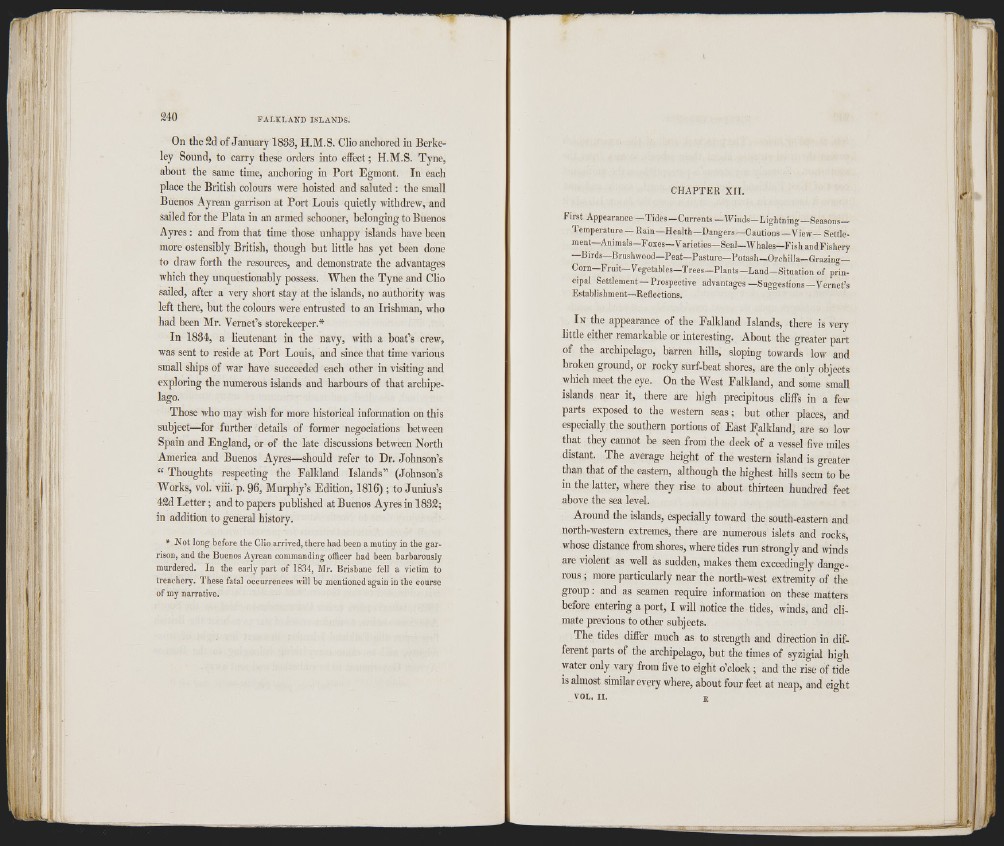
:
: i
On the 2d of January 1833, H.M.S. Clio anchored in Berkeley
Sound, to carry these orders into effect ; H.M.S. Tyne,
ahout the same time, anchoring in Port Egmont. In each
place the British colours were hoisted and saluted : the small
Buenos Ayrean garrison at Port Louis quietly withdrew, and
sailed for the Plata in an armed schooner, belonging to Buenos
Ayres : and from that time those unhappy islands have been
more ostensibly British, though but little has yet been done
to draw forth the resources, and demonstrate the advantages
which they unquestionabty possess. When the Tyne and Clio
sailed, after a very short stay at the islands, no authority was
left there, but the colours were entrusted to an Irishman, who
had been Mr. Vernet’s storekeeper.*
In 1834, a lieutenant in the navy, with a boat’s crew,
was sent to reside at Port Louis, and since that time various
small ships of war have succeeded each other in visiting and
exploring the numerous islands and harbours of that archipelago.
Those who may wish for more historical information on this
subject—for further details of former négociations between
Spain and England, or of the late discussions between North
America and Buenos Ayres—should refer to Dr. Johnson’s
“ Thoughts respecting the Falkland Islands” (Johnson’s
Works, vol. viii. p. 96, Murphy’s Edition, 1816) ; to Junius’s
42d Letter ; and to papers published at Buenos Ayres in 1832;
in addition to general history.
* Not long before the Clio arrived, there had been a mutiny in the garrison,
and the Buenos Ayrean commanding officer had been barbarously
murdered. In the early part of 1834, Mr. Brisbane fell a victim to
treachery. These fatal occurrences will be mentioned again in the course
of my narrative.
CPIAPTER Xir.
First Appearance —Tides—Currents —Winds—Lig-litning—Seasons—
Temperature — Rain—Health—Dangers—Cautions —View— Settlement—
Animals-Foxes—Varieties—Seal—Whales—Fish and Fishej-y
—Birds—Brushwood—Peat—Pasture—Potash—Orchilla—Grazing—
Corn—Fruit—Vegetables-Trees-Plants-Land—Situation of principal
Settlement — Prospective advantages—Suggestions Vernet’s
Establishment—Reflections.
I n the appearance of the Falkland Islands, there is very
little either remarkable or interesting. About the greater part
of the archipelago, barren hills, sloping towards low and
broken ground, or rocky surf-beat shores, are the only objects
which meet the eye. On the West Falkland, and some small
islands near it, there are high precipitous cliffs in a few
parts exposed to the western seas; but other places, and
especially the southern portions of East Falkland, are so low
that they cannot be seen from the deck of a vessel five miles
distant. The average height of the western island is greater
than that of the eastern, although the highest hills seem to be
in the latter, where they rise to about thirteen hundred feet
above the sea level.
Around the islands, especially toward the south-eastern and
north-western extremes, there are numerous islets and rocks,
whose distance from shores, where tides run strongly and winds
are violent as well as sudden, makes them exceedingly dangerous
; more particularly near the north-west extremity of the
group : and as seamen require information on these matters
before entering a port, I will notice the tides, winds, and climate
previous to other subjects.
The tides differ much as to strength and direction in different
parts of the archipelago, but the times of syzigial high
water only vary from five to eight o’clock ; and the rise of tide
is almost similar every where, about four feet at neap, and eight
VOL. I I . 1?
A .
V.